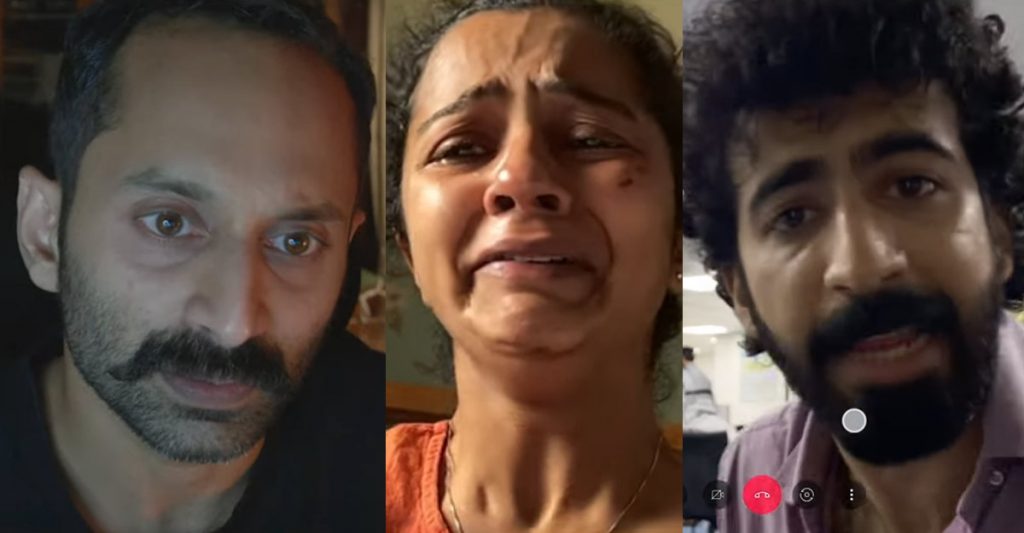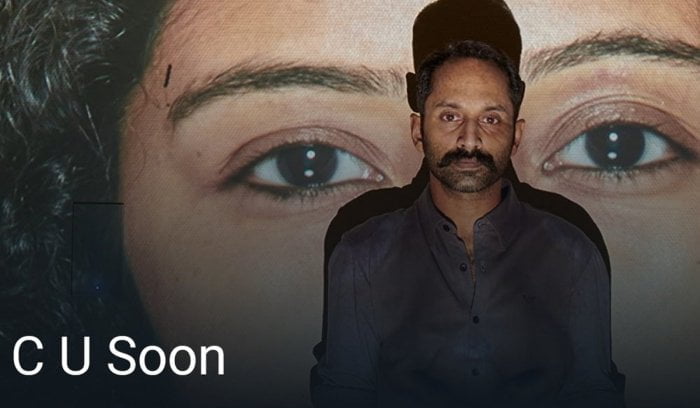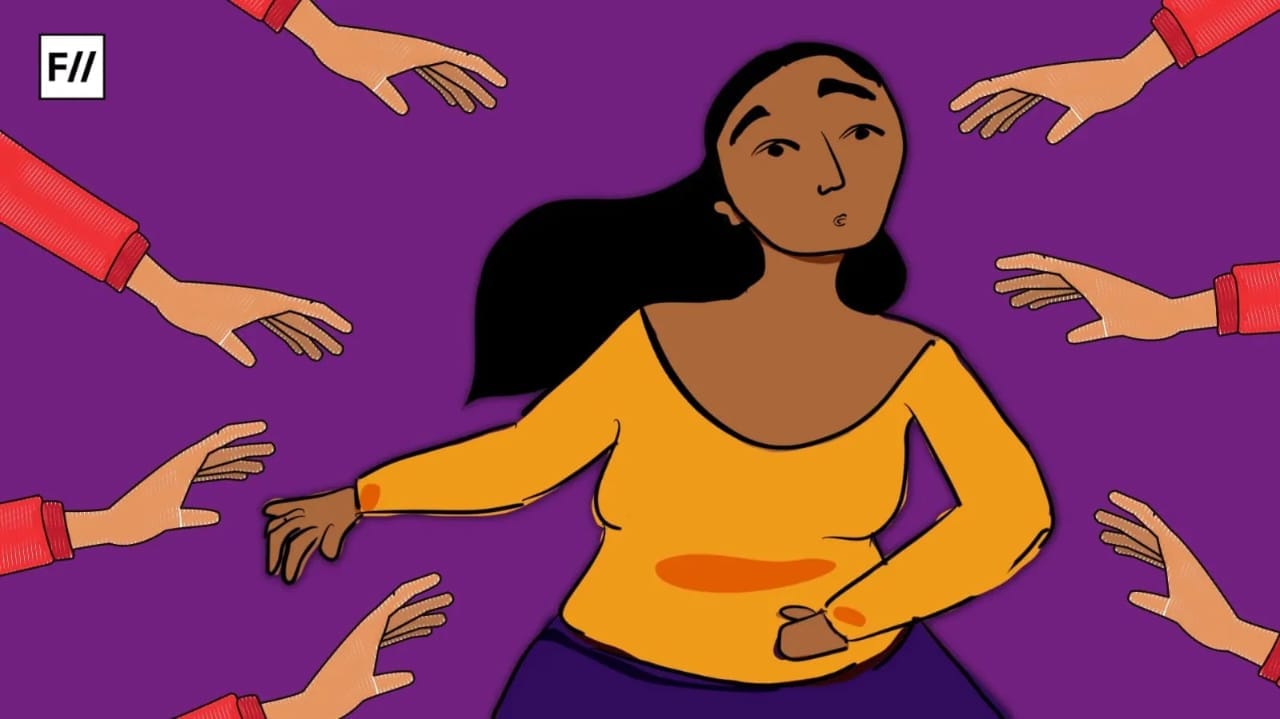Warning: This review contains spoilers for the movies ‘C U Soon’ and ‘Khuda Haafiz’.
One of the latest critically acclaimed OTT releases to come out of lockdown is C U Soon, released on Amazon Prime. The premise is as follows: Jimmy (Roshan Mathew), a Syrian Christian working in Dubai, falls in love with Anumol (Darshana Rajendran) online. Jimmy’s cousin Kevin (Fahadh Faasil) uses his internet hacking skills to perform what seems like a thorough background check on the prospective bride and confirms her credentials.
Subsequently, Anumol moves in with Jimmy following a violent assault by her ‘father’. When Jimmy tries to reconcile with his father-in-law, Anumol threatens to commit suicide and runs away, attracting the attention of the Dubai police to their domestic discord. Kevin finds out through his digital Sherlocking that Anumol was trafficked against her will from Kerala to Dubai, and that her ‘father’ is actually her pimp. Though she had applied for the job of a domestic help, she was forced to become a sex worker. Whether or not Anumol is traced, and whether Jimmy can get out of the ensuing legal wrangle, forms the rest of the film.

There isn’t much to analyse or critique on the technical front. The biggest novelty value of the film is that it is shot entirely through screen recording. In spite of that, their performances shine through. The initial scenes depicting the gradual, somewhat cheesy build-up of romance between Anu and Jimmy, set to Gopi Sundar’s enchanting background music, have a touch of old-school romance that is quite missing in recent films. Rajendran and Mathew bring the perfect mix of vulnerability and earnestness to their characters for endearing the audience. Faasil is inevitably superlative as Kevin. The haunted, ominous expression that he bears in publicity stills/thumbnails of the film, is in itself enough to arouse suspense for drawing viewers’ attention.
Though cinephiles will argue that the two films are as different as chalk and cheese, they both promote the conventional international and national discourse on the subject of trafficking. When one thinks of ‘trafficking’, it usually brings to mind imagery of exploited women and children being shipped across borders to satisfy the sexual desires of men.
It’s true that like countless other films dealing with women who perform sex work, even C U Soon largely perceives the female lead through the gaze of the men who are objectifying, or in Kevin’s case, spying on her. The audience sees her first as a potential love interest, then as a damsel in distress subjugated by a patriarchal family, a manipulative catfisher when her ‘truth’ is revealed, and lastly, as an innocent wronged girl. However Anumol does not need a male saviour—Jimmy is ancillary to her plans.
Her first priority is not finding love, settling into domesticity or taking revenge on those who wronged her—it’s simply returning home. Instead of subjecting her to gratuitous brutalisation or a convenient off-screen death, the film ends on an optimistic note, suggesting that Anu and Jimmy are still in love with each other and might reunite. This perhaps signifies a change in screenwriting sensibilities, wherein it is now probably considered ‘outdated’ to not give a ‘fallen woman’ her happy ending.
This brings to mind the recent Vidyut Jammwal action thriller, Khuda Haafiz (released on Hotstar) which features a similar plotline—the protagonist’s wife Nargis (Shivaleeka Oberoi) migrates to a fictional Middle-Eastern country on the promise of a job but is forced into sex trafficking. Unlike C U Soon, Khuda Haafiz follows a more conventional ‘knight in shining armour’ narrative where the hero Sameer (Jammwal) performs death-defying moves to rescue his wife from the evil international ‘flesh traders’. Though C U Soon adopted a more measured, practical ending, Khuda Haafiz, being a stereotypical action fairytale, ends with the prince and princess reuniting, their love for each other renewed and affirmed.
Though cinephiles will argue that the two films are as different as chalk and cheese, they both promote the conventional international and national discourse on the subject of trafficking. There is considerable feminist scholarship on how the anti-trafficking discourse that both the Indian public and cinema takes for granted is one marked by ‘sex work exceptionalism’ (For more reading, see this special EPW Engage issue on the 2018 Trafficking Bill). When one thinks of ‘trafficking’, it usually brings to mind the imagery of exploited women and children being shipped across borders to satisfy the sexual desires of men. The adoption of this narrative isn’t new—this has earlier been featured in films such as Awaarapan, Mardaani and Shivaay, amongst others.
This narrow conceptualisation of trafficking assumes that all women in sex work are blameless, hapless victims like Anu and Nargis who have been duped or coerced into the profession (A separate sociological cinema phenomenon that might be worth analysing is how the adult victims in these kind of films often tend to be non-Hindu women for some reason).
Sex work is not seen as a form of labour but as a crime against morality and dignity, and sex workers’ issues are not seen as a problem of economic exploitation but as a natural consequence of such a crime. In this traditionalist view, the only solution to end these problems is the abolition of all sex work, the raiding and closure of brothels, and the rescue and rehabilitation of sex workers, all of which is assisted by the forces of the carceral police State.
Unlike C U Soon, Khuda Haafiz follows a more conventional ‘knight in shining armour’ narrative where the hero Sameer (Jammwal) performs death-defying moves to rescue his wife from the evil international ‘flesh traders’. Though C U Soon adopted a more measured, practical ending, Khuda Haafiz, being a stereotypical action fairytale, ends with the prince and princess reuniting, their love for each other renewed and affirmed.
In Khuda Haafiz, this is expressly manifested in the form of Jammwal’s Sameer, whom the audience is supposed to assume is your everyday Ordinary Joe, but actually has super-ninja powers. However, Sameer doesn’t work alone—he takes help from a fictional Middle Eastern security organisation.
Interestingly, though the police is more of an obstacle than a friendly agent in C U Soon, it is startling how the film almost seems to normalise the pervasive internet surveillance employed by Faasil’s Kevin in tracking down Anu. In a span of a few days, Kevin is able to find out the most personal details about someone whom he has not even seen in person, without any serious consequences or self-reflection on the dangers of doing so on his part. Though his justification for doing so is saving his cousin brother, this blatant violation of privacy is taken for granted right up till the climax, especially because it’s seen as contributing towards a ‘larger cause’.
One would like to think that this was deliberately done by the filmmakers to satirise internet spying and highlight audience attention towards the same, and perhaps that was the intention. However, the underlying message seems to be that, it is acceptable for a ‘Big Brother’ like power to violate privacy norms to a certain degree for the purpose of ensuring one’s safety (Interestingly, the personality arc of Kevin’s dudebro character somewhat mirrors that of Kappela‘s Roy, another ‘jerk with a heart of gold who will ultimately save you’ type male figure).
Also read: COVID-19: How The Pandemic May Increase Human Trafficking in India
At the end of both C U Soon and Khuda Haafiz, the heroines return back to the shelter of their homes and families, a resolution which aligns with conservative Indian bourgeoisie sensibilities. Rather than undertaking the difficult task of exploring their trauma and difficulty adjusting to a normal life after their horrifying experiences abroad, both films end by affirming the heroines’ viability as romantic interests for the male protagonists.
Before anyone jumps to the defense, I am aware that they are meant to be feel-good films for lockdown entertainment and not serious academic expositions on the subject of trafficking. However, given that this narrative is becoming a recurring pattern in films and is likely to influence laypersons’ opinions, I find it is pertinent to highlight these issues all the same.

Of course, this is not to suggest that women who are trafficked into sex work against their will should not have the option of seeking rescue and punishment of their offenders. However, many women who are trafficked into sex work or forced labour hail from socio-economically vulnerable backgrounds, and may choose to remain in the profession, rather than return home, because of the relative financial security it offers them. They do not have a Jimmy or Sameer to lead them away into the horizon, and may not even desire such figures in their lives.
What happens to them? What if they want to continue sex work, but also wish to claim fair wages and working conditions and be protected against assault? Are criminal law provisions or even NGO-driven ‘rescue and rehabilitation’ programmes adequate measures to address their concerns? If anything, it is commonly known that sex workers often form a target for police extortion, and rescue homes are places where further sexual abuse takes place.
Further, and more importantly, trafficking is not limited to sex work but encompasses other forms of forced labour such as bonded labour, contract labour, child labour etc., which do not take place across borders, at the behest of seedy international mafiosos, but occur inside our own (mostly upper-caste) homes and industries. Though both C U Soon and Khuda Haafiz hint at the economic difficulties that lead their heroines to take up suspicious jobs abroad, a darker reality that filmmakers and audiences are perhaps reluctant to confront, is that of the internal socio-economic hierarchies that motivate domestic labour trafficking.
Also read: Infographic: Human Trafficking In India
The exploitation of workers in India, especially migrants, has intensified due to the job uncertainties and financial disabilities resulting from the pandemic (and I daresay the subsequent mismanagement thereof). The solution to their problems does not lie in beating up traffickers and ‘rescuing’ workers but in lobbying for stronger labour law rights and protections, and the creation of educational and economic opportunities that ensure they do not have to submit to such inequalities in bargaining power in the first place.
References
About the author(s)
Megha Mehta is a legal researcher based in Delhi.




